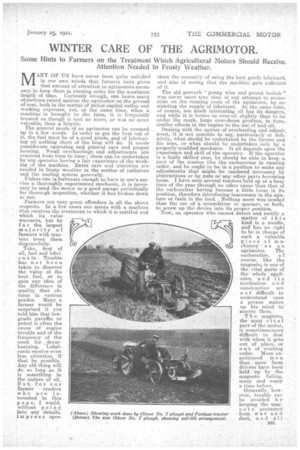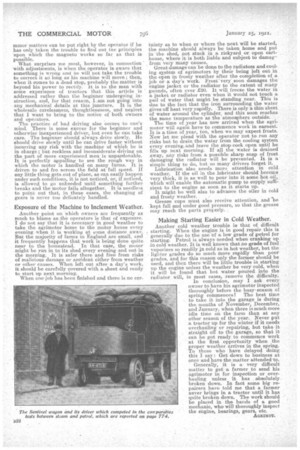WINTER CARE OF THE AGRIMOTOR.
Page 29

Page 30

If you've noticed an error in this article please click here to report it so we can fix it.
Some Hints to Farmers on the Treatment Which Agricultural Motofs Should Receive. Attention Needed In Frosty Weather.
MANY OF US have never been quite satisfied in our own minds that farmers have given . that amount of attention to agrimotors necessary 'to keep them in running order for the maximum length of tine. Curiously enough, one hears many objections raised against the agrimotor on the ground of cost, both in the matter of initial capital outlay and working expenses yet, at the same time, when a. machine is brought to the farm, it is frequently treated as though it. cost no more, or was no more valuable; than a bicycle.
The general needs of an agrimotar can be summed up in a few words. In order to get the best out of it, the fuel must be of a good grade, and of lubricating oil nothing short of the best will do. It needs considerate operating and general care and proper housing. Small overhaillings: and adjustments are required from time to time ; these can be undertaken by any operator having a fair experience of the working of the machine. Extra care and attention are needed in frosty weather in the matter of radiators and the cooling system. generally. Unless one is fortunate enough to have in one's service a thoroughly experienced mechanic, it is necessary to send the motor to a good garage periodically for thorough inspection, whether it has broken down or not.
Farmers are very great offenders in all the above respects. In a few cases one meets with a machine that receives the treatment to which it is entitled and • which its value warrants, but by f a r the largest majority ,of farmers with tractors treat them disgracefully.
Take, first of all, fuel and lubri c a n ts . Trouble has not been taken to discover the value of the ' best fuel, or to gain any idea of the difference in ' quality that obtains in various grades. Many a farmer would be surprised if you told him that lowgrade paraffin or petrol is often the cause of engine trouble and of the frequency of the need for decarbonizing. 'Lubricants receive even less attention, if that be possible. Any old thing will
do so long as is something in the nature of oil. But, for our .farmer readers who are interested in this page, I would, without going into any details,, (Above) Showing work done by Olive
them the necessity of using the best grade lubricant, and also of seeing that the machine gets sufficient of it.
The old proverb " penny wise and pound foolish" was never more true than of any attempt to economize on the running costs Of the agrimotor, by restricting the supply of lubricant. At the same tithe, of course, too much lubricating oil has its dangers, and while it is better to over-oil slightly than to be under the mark, large over-doses produce, in time,. similar effects in the engine to the use of bad oil.
Dealing with the matter of overhauling apd adjust-, ment, it is not possible to say, particutaily or definitely, what should be undertaken by the farmer and his man, or what should be undertaken 'only by a properly-qualified mechanic. It all depends upon the experience and skill of the operator. If the operator is a fairly skilled man, he should be able to keep a part of the tractor like the carburetter in running order, and he ought to be in a position to make any adjustments that might be rendered necessary by obstructions or by nuts or-any other parts becoming loose. I have seen several tractors held up at a busy time of the year through no other cause than that of the carburetter' having become a little loose in it position, therefore introducing inaccuracy in the mixture or fault in the feed. Nothing more was needed than the use of a screwdriver or, spanner, or both, to screw up the device into its proper position.
Now, an operator who cannot detect and rectify a• matter of this kind is a noodle, and has no right to be in charge of such a valuable piece of machinery as an agrimotor. The carburetter, o f course, like the magneto,-is one of the vital parts of the whole 'appliance, And its mechanism and construction are n o t difficult to understand once a person makes up his mind to master them.
T Ii e magneto, the most vital part of the motor, is siometimesmore difficult to deal with when it gets out of place, or o u t of working order. More experienced m e than mere farm drivers have been held up by the magneto failing, many and many a time before.
Generally, however, trouble car, be avoided b y keeping themagneto protected front w et an d dust, and-all
. B21. minor matters can be put right by the operator if he has only taken the trouble to fuid out tne principles upon which the magneto works so far as that is possible.
What. surprises me most, however, in connection ' with adjustments, is when the operator is aware that something is wrong and he will not take the trouble to correct it so long as his machine will move ; then, when it comes to a dead stop, probably the matter is beyond his power to rectify. It is to the man with some experience of tractors that this article is addressed rather than the beginner undergoing instruction, and, for that reason, Lam not. going into any mechanical details at this juncture. It is the wholesale carelessness, thoughtlessness, and neglect that I want. to bring to the notice of both Owners and operators. The practice of bad driving also occurs to one's mind. There is some excuse for the beginner and titherwise inexperienced driver, but even he can take care. The beginner should always drive slowly. He should drive slowly until he can drive faster without incurring any risk with the machine of which he is in charge ; but reckless and inconsiderate driving on the part, of more experienced men is unpardonable. It is perfectly appalling to see the rough way in which the motor is handled on. many farms. It is driven to and fro across the field at full speed. If any little thing gets out of place, as can easily happen under such conditions, it is not. noticed, or, if noticed, is allowed to go unheeded until something further breaks and the motor fails altogether. It is needless to point out that, in these eases, the changing of gears is never too delicately handled.
Exposure of the Machine to Inclement Weather.
Another point on which owners are frequently as much to blame as the operators is that of exposure. I do not say that it is necessary in good weather to take the agrimotor home to the motor house every evening when it is working at some distance away. But the majority of farms in England are small, and it frequently happens that work is being done quite near to the homestead. In that case, the motor might be run in to its shed every evening and out in the morning. It is safer there and free from risks of malicious damage or accident either from weather or other causes. When left out after a day's work, it should be carefully covered with a sheet and ready to start up next morning.
When one•job has been finished anti there is no cer
tainty as to when or where the next will be started, the machine should always be taken home and put in the shed, not stuck in a rickyard or open carthouse, where it is both liable and subject to damage from very many causes.
Great damage can be done to the radiators and cooling system of agrimotors by their being left out in the open in frosty weather after the completion of a job or a day's work. Frost:verysoon damages the engine jacket or the radiator to the extent of many pounds, often over 220. It will freeze the water in a jacket or radiator even when it would not touch a pail of water that might be standing near. This is due to the fact that the iron surrounding the water gives off heat very rapidly. There is only a thin sheet of water around the cylinder; and this soon reaches the same temperature as the atmosphere outside.
The time of year has now arrived when the agrimotor will again have to commence work in earnest. It is a time of year, too, when we may expect frosts. Now let me plead with the operator not to run any risks but to drain the water from the cooling system every evening, and leave the stop-cock open until he fills up next morning. If all the water is drained away, any risks from a possible sharp snap of frost damaging the radiator will be prevented. It is a • simple thing to do, but so many drivers forget it. Lubrication, also needs more attention in cold weather. If the oil in the lubricator should become very thick, it is as well to pour into it some hot -oil, which will enable the automatic pump to supply sufficient to the engine as soon as it starts up. It might be well also to advance the oiler in cold and frosty weather. Grease cups must also receive attention, and "be kept full and under good pressure, so that the grease may reach the parts proeerly.
Making Starting Easier in Cold Weather.
Another cold weather trouble is that of difficult starting. When the engine is in good repair this is generally due to the use of a low grade of petrol for starting. Petrol is always needed when cranking up in cold weather. It is well known that no grade of fuel vaporizes so readily in cold as in hot weather, but the lighter grades do so much more rapidly than poor grades, and for this reason only the former should be used, and then there will be little trouble in starting up the engine unless the weather be very cold, when it will be found that hot water poured into the radiator will, in most eases, remove the difficulty.
In conclusion, may I ask every owner to have his agrimotor inspected thoroughly before the busy' seasonof spring commences? The best time to take it into the garage is during the. months of November, December, and January, when there is much more idle time on the farm than at any other season of the year. Never put a tractor up for the winter if it needs overhauling or repairing, but take it straight off to the garage, so that it can be got ready to commence work at the first opportunity when the proper weather arrives in the spring. To those who have delayed doing this I say : Get down to business at once arid have the matter attended-to,
Generally, it is a very difficult matter to get a farmer to send his agrimotor in for inspection or overhauling unless it has absolutely broken down. In fact some big repairers have told me that a farmer never brings in a tractor until it has quite broken down. The work should be placed in the hands of a good mechanic, who will thoroughly inspect the engine, bearings, gears, etc. AGRIMOT.
































